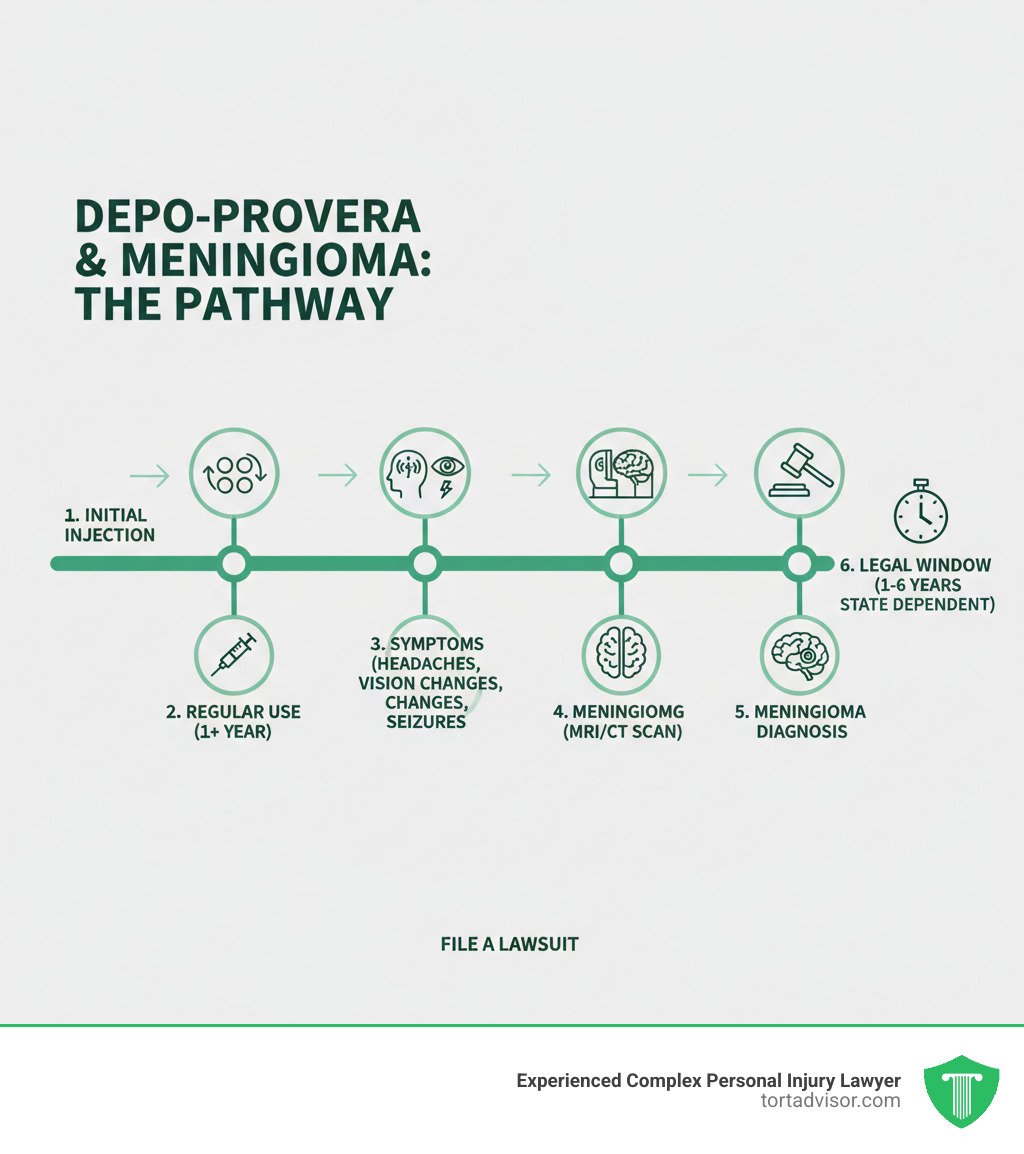


Understanding Your Rights After a Depo-Provera Diagnosis
Depo-Provera lawsuit eligibility depends on three key factors: documented use of the contraceptive, a diagnosis of a meningioma tumor, and filing a claim within your state’s legal timeframe. Here’s a quick look at what you need to qualify:
Basic Eligibility Requirements:
- Proof of Use: Records of at least two injections of brand-name Depo-Provera, Depo-SubQ Provera 104, or authorized generics.
- Duration: Generally one year or more of use.
- Diagnosis: A formal medical diagnosis of an intracranial or spinal meningioma after starting the injections.
- Timing: Filing your claim before your state’s statute of limitations expires (typically 1-6 years).
If you developed a brain tumor after using the Depo-Provera contraceptive shot, you are not alone. Recent scientific evidence links this injection to a significantly increased risk of meningiomas—tumors on the protective layers of the brain and spinal cord. A 2024 study in the British Medical Journal found that women who used Depo-Provera for over a year were over 5 times more likely to develop these tumors.
As a result, thousands of women are filing lawsuits against Pfizer, alleging the company failed to warn patients and doctors about this risk. With over 1,200 lawsuits already consolidated in federal court as of October 2025, many are asking: Do I qualify to file a claim?
This article breaks down the criteria for Depo-Provera lawsuit eligibility. We’ll cover the requirements, the evidence you’ll need, and what compensation may be available, so you can take action before legal deadlines pass.
My name is Mason Arnao. While my expertise is in technology, I’ve dedicated significant resources to understanding complex legal processes like the Depo-Provera litigation. My work involves connecting people with experienced attorneys, and I know how crucial it is to understand your rights and act quickly when facing health issues from pharmaceutical products.
Easy Depo-Provera lawsuit eligibility glossary:
- depo-provera lawsuit
- depo-provera lawsuit payout date
The Core Injury: Understanding the Link Between Depo-Provera and Meningiomas
The core of Depo-Provera lawsuit eligibility is the injury itself: a meningioma tumor. These tumors grow on the protective layers of the brain and spinal cord and can be life-altering, often requiring surgery and causing symptoms that affect vision, balance, and cognitive function.
The alarm was raised due to Depo-Provera’s active ingredient, medroxyprogesterone acetate (MPA), a synthetic progestin hormone. While effective for contraception, growing evidence suggests prolonged exposure can stimulate tumor growth. A landmark 2024 study in the British Medical Journal revealed a dramatically increased risk for long-term users.
This scientific link is the driving force behind thousands of lawsuits. Women who trusted Depo-Provera are now facing serious health issues they were not warned about. To learn more, see our guide, “Does Depo-Provera Cause Brain Tumors?”.
What is a Meningioma?
A meningioma is a tumor that develops in the meninges, the protective membranes surrounding the brain and spinal cord. They are the most common type of primary brain tumor, and most are non-cancerous and slow-growing.
However, even a benign tumor can cause serious harm by pressing on the brain. Symptoms depend on the tumor’s location and size and can include persistent headaches, vision changes, seizures, weakness or numbness in limbs, and balance issues. These symptoms often start subtly and worsen over time, making early diagnosis critical. For more on complications, see our resource on “Depo-Provera Severe Side Effects”. The Mayo Clinic also offers more information about meningiomas.
Scientific Evidence Linking Depo-Provera to Brain Tumors
The link between Depo-Provera and meningiomas is supported by significant scientific research. A pivotal March 2024 study in the British Medical Journal (BMJ) found that women using progestin-based drugs like Depo-Provera for over a year had over 5 times the risk of developing a meningioma. The study specifically noted a 5.6 times increased risk for intracranial meningiomas requiring surgery.
This wasn’t the first red flag; meningioma cells have been known to contain progesterone receptors since the 1980s. What makes the current litigation compelling is the allegation that Pfizer knew of these risks but failed to update its warning labels in the U.S., unlike in Europe and Canada. This alleged failure to warn is central to the lawsuits. The evidence of heightened risk with prolonged use is especially important for Depo-Provera lawsuit eligibility. For more details, visit our page, “Depo Shot Brain Tumor”.
Key Criteria for Depo-Provera Lawsuit Eligibility
To determine if you are eligible for a Depo-Provera lawsuit, your case must meet several core requirements.
1. History of Depo-Provera Use
First, you must have documented proof of using brand-name Depo-Provera, Depo-SubQ Provera 104, or an authorized generic version. An authorized generic is the same drug as the brand-name, licensed by the original manufacturer.
Most legal teams look for a history of at least two injections, though some may require four or more over 12 months to show prolonged exposure. Even if you used a generic, you may still have a case. Under innovator liability principles in some states, the brand manufacturer (Pfizer) can be held responsible for failing to warn about risks, even for its generic counterparts. For more details, see our FAQ, “Who May Qualify to File a Depo Provera Lawsuit?”.
2. Duration and Frequency of Use
Since the risk of meningioma increases with longer use, the duration and frequency of your injections are critical for your Depo-Provera lawsuit eligibility. The 2024 BMJ study focused on women who used these drugs for “more than a year.” Therefore, lawyers generally look for at least one year of continuous use (about four quarterly injections).
Longer use, such as five years or more, may strengthen a claim. However, even shorter periods of one to two years could still qualify, especially if the meningioma required invasive treatment. For a complete guide, refer to our “Depo-Provera Lawsuit Qualifications Guide”.
3. Diagnosis of a Qualifying Injury
A formal medical diagnosis of a qualifying injury is non-negotiable. This means a licensed doctor has confirmed your condition, usually with MRI or CT scans and sometimes a biopsy. The diagnosis must be an intracranial meningioma (in the brain) or a spinal meningioma (on the spinal cord), as these are the tumors most strongly linked to Depo-Provera.
Crucially, the diagnosis must have occurred after you started using the drug. If you had a pre-existing tumor, it is much harder to link it to Depo-Provera. Cases involving tumors that required surgery, radiation, or caused significant neurological issues are often considered stronger. Find more information in our “Depo-Provera Injury Claim Complete Guide”.
Building Your Case: Essential Evidence and Documentation
Building your Depo-Provera lawsuit eligibility case requires assembling the right documentation to create a clear picture of what happened. The right evidence is crucial for a successful claim.
Medical and Prescription Records
Your medical records are the foundation of your case. They provide objective proof of your medical journey. Key documents include:
- Diagnosis Confirmation: Notes from your primary care doctor, neurologist, or neurosurgeon, and pathology reports from any biopsies.
- Imaging Results: MRI and CT scans that show the tumor’s size, location, and characteristics.
- Treatment History: Surgical reports, radiation logs, medication prescriptions, and follow-up care plans.
- Proof of Use: Pharmacy or doctor’s office records showing when you received your Depo-Provera injections. These dates are vital for establishing a timeline.
Records showing you were healthy before using Depo-Provera can also help rule out other causes. For guidance on obtaining your files, the Department of Health and Human Services offers resources on how to get your medical records.
Documentation of Damages
Proving you were injured is only half the battle; you must also document how much that injury has cost you. This includes both economic and non-economic damages.
Economic Damages:
- Medical Bills: Collect every invoice and receipt for surgery, hospitalization, doctor’s visits, medications, and therapy.
- Lost Wages: Gather pay stubs and employment records to prove lost income from missed work. If your earning capacity has been permanently affected, document that as well.
- Future Medical Costs: Obtain estimates from your medical team for long-term care, such as ongoing monitoring scans or potential future treatments.
Non-Economic Damages:
This covers the intangible impact on your quality of life. Consider keeping a journal to document:
- Pain and Suffering: Chronic headaches, post-surgical pain, and other physical symptoms.
- Emotional Distress: Anxiety, depression, or fear related to your diagnosis and treatment.
- Loss of Enjoyment of Life: How the injury has affected your hobbies, relationships, and daily activities.
To get a rough idea of potential compensation, you can use our Depo-Provera Settlement Calculator. However, every case is unique. The more complete your documentation, the stronger your position will be.
Navigating Potential Roadblocks: Deadlines and Disqualifying Factors
Even with a strong case, certain roadblocks can affect your Depo-Provera lawsuit eligibility. Understanding these issues, such as legal deadlines and disqualifying factors, is crucial for protecting your right to file a claim. Being aware of these problems now gives you time to address them with an experienced attorney. For more context on the litigation, see our “Depo-Provera Lawsuit News Ultimate Guide”.
Understanding the Statute of Limitations
The law sets a strict deadline for filing a lawsuit, known as the “statute of limitations.” Once this deadline passes, your right to seek compensation is usually lost permanently. This timeframe varies by state, typically ranging from one to six years for personal injury claims.
However, the clock doesn’t always start on the day of your last injection. Many states use a “findy rule,” which means the statute of limitations begins when you were diagnosed with your meningioma or when you first learned (or reasonably should have learned) that Depo-Provera might have caused it. This is highly relevant, as the link became widely known with the 2024 BMJ study. If you were diagnosed years ago but only recently learned of the connection, you may still be eligible.
Despite this flexibility, it is vital to act quickly. Gathering records and building a case takes time. Consulting an attorney as soon as possible is the best way to ensure you meet all deadlines.
Common Factors That May Disqualify a Claim
Certain circumstances can complicate or disqualify a claim. Be upfront with your attorney about these factors for a realistic assessment.
- Prior History of Brain Tumors: If you had a meningioma or other brain tumor before using Depo-Provera, proving the drug caused your current condition is extremely difficult.
- Use of Unauthorized Generics: If you used a generic version from a manufacturer with no connection to Pfizer, your ability to sue the brand-name maker may depend on your state’s specific laws regarding innovator liability.
- Insufficient Use or Timing: A very short duration of use (e.g., one injection) or a diagnosis that occurs decades later may weaken the causal link, making the case harder to prove.
- Concurrent Use of Other Hormonal Drugs: If you were taking other hormone-altering medications, it can complicate the case. An attorney will need to analyze your full medical history to determine which drug was the likely cause.
These issues don’t automatically mean you have no case, but they do require careful legal analysis. The only way to know for sure about your Depo-Provera lawsuit eligibility is to have a legal professional evaluate your specific situation.
The Role of an Attorney and Potential Compensation
Filing a lawsuit against a pharmaceutical giant like Pfizer is not a battle to fight alone. An experienced attorney is your essential advocate in seeking justice. These cases are currently being handled through a Multidistrict Litigation (MDL), specifically the Depo-Provera Products Liability Litigation, MDL 3140, in the U.S. District Court for the Northern District of Florida. This process coordinates hundreds of individual cases for efficiency and requires a lawyer who understands how MDLs operate.
How a Lawyer Assesses Your Depo-Provera Lawsuit Eligibility
When you contact a law firm, they will conduct a thorough evaluation to determine your Depo-Provera lawsuit eligibility. This process typically includes:
- Free Case Review: You’ll share your story, including your Depo-Provera usage and diagnosis timeline, with no financial commitment.
- Evidence Analysis: Your lawyer will help you gather all necessary medical and pharmacy records, building a clear timeline connecting the drug to your diagnosis.
- Establishing Causation: This is the most critical step. Your attorney will work with medical experts to provide a professional opinion linking your tumor to Depo-Provera, referencing key scientific evidence like the BMJ study.
- Navigating Legal Arguments: Your lawyer will handle all complex legal aspects, including countering Pfizer’s defenses and managing your case within the MDL process.
To learn more about the rapid growth of this litigation, read our article, “Is Depo-Provera Emerging as a Major Mass Tort in 2025?”.
What Compensation Can Be Claimed?
If your case is successful, you could receive substantial compensation. While no amount of money can undo the harm, it aims to address your losses and hold the manufacturer accountable. Damages may include:
- Economic Damages: These cover tangible financial losses, including past and future medical expenses, lost wages, and reduced earning capacity.
- Non-Economic Damages: These address intangible suffering, such as pain and suffering, emotional distress, and loss of quality of life due to the injury’s impact on your daily existence.
- Punitive Damages: In some cases, these may be awarded to punish the defendant for particularly egregious conduct, such as knowingly hiding risks, and to deter similar behavior in the future.
The value of your claim depends on the severity of your injury, the extent of your treatment, and the strength of the evidence. For a detailed breakdown, see our “Depo-Provera Lawsuit Compensation Guide 2025”.
Frequently Asked Questions about Depo-Provera Lawsuit Eligibility
Here are answers to some of the most common questions women have about their Depo-Provera lawsuit eligibility.
Can I file a lawsuit if I used a generic version of Depo-Provera?
Yes, in many cases, you can file a lawsuit even if you used a generic version. If you used an “authorized generic,” your claim is as strong as one for the brand-name drug. Additionally, a legal concept called “innovator liability” exists in some states. It allows you to sue the brand-name manufacturer (Pfizer) because generic drug makers are required to use the same warning label. If Pfizer’s label was inadequate, that failure extends to the generics. An attorney can determine if this applies in your state.
What if I stopped using Depo-Provera years before my diagnosis?
This is a common scenario and does not necessarily disqualify you. Meningiomas are often slow-growing, and a diagnosis can occur years after you stop using the drug. Your eligibility will depend on your state’s statute of limitations and its “findy rule.” This rule often starts the legal clock at the time of diagnosis or when you reasonably learned of the link to Depo-Provera, not when you stopped using it. A case-by-case evaluation by an attorney is necessary to determine if you can still file.
How much does it cost to hire a Depo-Provera lawyer?
Most experienced Depo-Provera lawyers work on a contingency fee basis. This means you pay nothing upfront. The attorney covers all costs of litigation and is only paid a percentage of the compensation you receive if your case is successful. If you do not win your case, you owe no legal fees. This arrangement allows you to seek justice without financial risk.
Take the Next Step: Determine Your Eligibility Today
If you used Depo-Provera and were later diagnosed with a meningioma, the next step is to understand your rights and act before legal deadlines expire. You do not have to steer this complex process alone.
Depo-Provera lawsuit eligibility generally requires documented use of the drug for at least one year, a formal diagnosis of an intracranial or spinal meningioma, and filing within your state’s statute of limitations. If you meet these criteria, you may be entitled to compensation for medical bills, lost income, and pain and suffering.
The legal landscape is moving fast, with over 1,200 cases already filed in the federal MDL. Time is critical, as waiting too long could forfeit your right to seek justice.
At Tort Advisor, we connect individuals with experienced attorneys who handle pharmaceutical litigation. The lawyers in our network offer free, no-obligation case reviews and work on a contingency fee basis, meaning you pay nothing unless you win. They can quickly assess your Depo-Provera lawsuit eligibility and guide you through the legal process.
Take the first step today. A free case evaluation will provide the information you need to make an informed decision. You deserve answers and accountability for the harm you’ve suffered. Contact us to be connected with a qualified legal expert for your Depo-Provera Lawsuit.
Free Confidential Case Evaluation
Complete the short form below to get an immediate FREE case review with an expert in your specific claim. Don't wait, your case could be time sensitive to file a claim.
Related Posts
Did a North Dakota product cause harm? Understand product liability, your rights, and how to take action for defects.
Get justice for clergy abuse. Find an expert Priest abuse lawyer to navigate complex laws and hold institutions accountable.
Diagnosed with meningioma after Depo-Provera? Understand potential Depo-Provera lawsuit settlements, risks, & how to claim compensation.
Uncover the truth about uber sexual assault cases. Learn about the alarming scale, Uber's accountability, and legal options for justice.
Facing wildfire losses? Discover the best wildfire lawsuit attorneys in California to fight for your full recovery and justice.
Exposed to Roundup & diagnosed with NHL? Discover how to sue Monsanto, understand eligibility, & seek compensation. Your guide to justice.










